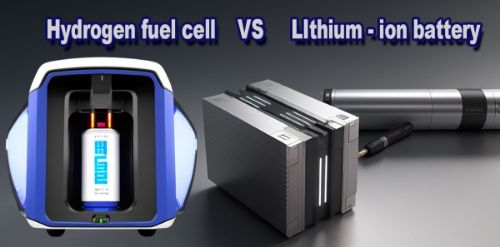In the rapidly evolving landscape of energy storage and power generation, two prominent players have emerged: Hydrogen Fuel Cells and Lithium Batteries. These technologies hold the key to shaping the future of transportation, renewable energy, and beyond. Let's delve into a detailed comparison to understand the strengths, weaknesses, and applications of each.
| Criteria | Hydrogen Fuel Cells | Lithium Batteries |
|---|---|---|
| Energy Density | High by weight, lower by volume | High by weight and volume |
| Efficiency | Efficient in converting chemical energy to power | Efficient in storing and discharging electrical energy |
| Infrastructure | Developing; limited availability of refueling stations | Established; widespread charging infrastructure |
| Environmental Impact | Depends on hydrogen production source | Mining and processing of raw materials; recycling required |
| Cost | Generally more expensive | Costs have reduced and continue to decrease |
| Applications | Automotive (e.g., fuel cell vehicles), aerospace, stationary power | Electric vehicles, consumer electronics, grid storage |
| Varieties of Cells | Polymer electrolyte membrane (PEM), alkaline, solid oxide | Lithium-ion, lithium polymer, lithium iron phosphate |
| Ease of Manufacturing | Complex manufacturing process for fuel cells | Established manufacturing processes for batteries |
| Raw Materials | Hydrogen (from natural gas, electrolysis using electricity) | Lithium, cobalt, nickel, manganese, graphite, electrolytes |
| Chemical Name | Hydrogen | Lithium cobalt oxide (LiCoO2), lithium iron phosphate (LiFePO4), etc. |
The Power Duel: Hydrogen Fuel Cells vs. Lithium Batteries
1. Energy Density:
- Hydrogen Fuel Cells: High by weight but lower by volume.
- Lithium Batteries: High energy density in both weight and volume.
2. Efficiency:
- Hydrogen Fuel Cells: Efficient conversion of chemical energy to power.
- Lithium Batteries: Efficient storage and discharge of electrical energy.
3. Infrastructure:
- Hydrogen Fuel Cells: Developing; limited refueling stations.
- Lithium Batteries: Established; widespread charging infrastructure.
4. Environmental Impact:
- Hydrogen Fuel Cells: Depends on hydrogen production source.
- Lithium Batteries: Mining and processing of raw materials; recycling required.
5. Cost:
- Hydrogen Fuel Cells: Generally more expensive.
- Lithium Batteries: Costs have reduced and continue to decrease.
6. Applications:
- Hydrogen Fuel Cells: Automotive (fuel cell vehicles), aerospace, stationary power.
- Lithium Batteries: Electric vehicles, consumer electronics, grid storage.
7. Varieties of Cells:
- Hydrogen Fuel Cells: Polymer electrolyte membrane (PEM), alkaline, solid oxide.
- Lithium Batteries: Lithium-ion, lithium polymer, lithium iron phosphate.
8. Ease of Manufacturing:
- Hydrogen Fuel Cells: Complex manufacturing processes.
- Lithium Batteries: Established manufacturing processes.
9. Raw Materials:
- Hydrogen Fuel Cells: Hydrogen (from natural gas, electrolysis).
- Lithium Batteries: Lithium, cobalt, nickel, manganese, graphite, electrolytes.
10. Chemical Name:
- Hydrogen Fuel Cells: Hydrogen.
- Lithium Batteries: Lithium cobalt oxide (LiCoO2), lithium iron phosphate (LiFePO4), etc.
Decoding the Choices
Applications:
- Hydrogen Fuel Cells are making waves in the automotive and aerospace sectors, providing a clean alternative to traditional fuels. Lithium Batteries, on the other hand, dominate the electric vehicle market and power our portable devices.
Varieties of Cells:
- Hydrogen Fuel Cells boast different types, including Polymer Electrolyte Membrane (PEM) and solid oxide, each with its own set of advantages. Lithium Batteries offer a variety of chemistries, such as lithium-ion and lithium iron phosphate, catering to diverse needs.
Environmental Impact:
- The environmental impact of both technologies hinges on their production and disposal methods. Hydrogen's impact depends on its production source, while lithium batteries require responsible mining and recycling practices.
Infrastructure and Cost:
- While hydrogen infrastructure is still in development, lithium batteries benefit from a well-established charging network. Cost-wise, lithium batteries have witnessed significant reductions, making them more economical in many applications.
In the quest for cleaner, more efficient energy solutions, both Hydrogen Fuel Cells and Lithium Batteries play pivotal roles. The right choice depends on the specific requirements of the application, weighing factors such as energy density, infrastructure, and environmental considerations.
Which side are you on in this power duel? Share your thoughts in the comments below!
Remember, the future of energy is dynamic, and the choice between hydrogen and lithium is a key player in shaping that future. Stay tuned for more updates on the evolving world of energy storage!


